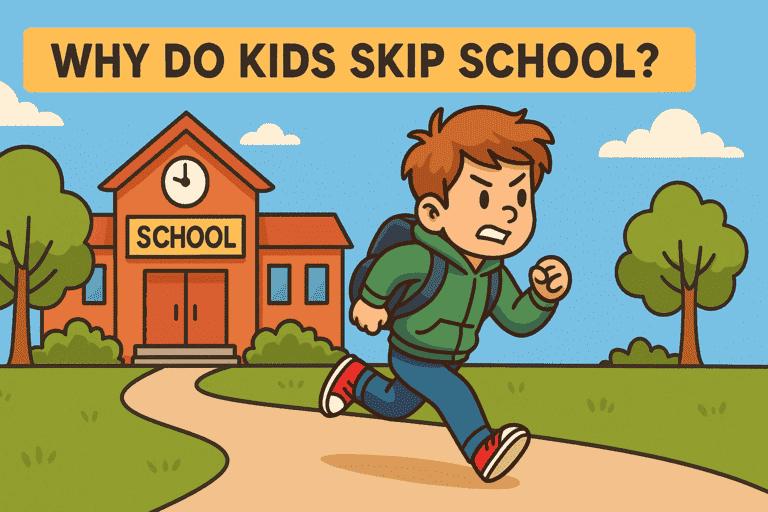Many parents assume kids skip class because they’re lazy or don’t care. But in most cases, skipping school is a sign of something deeper—stress, fear, or feeling disconnected.
In one story shared online, a student vanished after the first week of school and still appeared on the class roster with more than forty absences. Others explained why this happens: tough home lives, mental health struggles, bullying, transportation problems, or schools that punish tardiness more harshly than absences. Skipping isn’t always rebellion—it’s often a way to cope when school feels overwhelming.

- Table Of Contents
- PART 1. What Skipping School Really Means
- PART 2. Common Myths About Skipping School (and the Real Truth)
- PART 3. Why Kids Skip School: The Real Reasons
- PART 4. How to Handle and Prevent School Skipping
- PART 5.Common Questions Parents Often Ask
PART 1. What Skipping School Really Means
“Skipping” can sound casual, but schools often call it truancy or chronic absenteeism—when a student misses more than 10% of classes in a term or year. It’s not just one bad week; it’s a pattern.
One Reddit user shared how a classmate went missing for months yet was still listed as enrolled. That might sound rare, but it’s not. Many teachers say they see this every year, especially after the pandemic disrupted routines and mental health.
Skipping school isn’t always about defiance. Sometimes it’s about:
- Not feeling safe at school.
- Problems at home.
- Anxiety, depression, or burnout.
- Simply being too tired to function.
When a student disappears from class, it’s often their way of saying something’s not working.
PART 2. Common Myths About Skipping School (and the Real Truth)
Myth 1: “Some kids just don’t care.”
Reality: Most do care, but they feel hopeless or disconnected. One user said, “School sucked, home sucked—so I ditched.” Skipping gave them a few hours of peace in an otherwise chaotic life.
Myth 2: “It’s bad parenting.”
Sometimes yes—but not always. Many parents try everything: early alarms, grounding, medication, counseling. Some kids still can’t cope, especially if they have ADHD, autism, or anxiety.
Myth 3: “Punishment will fix it.”
Not really. When schools punish tardiness or absences harshly—detention, suspension—it often makes things worse. Kids start hiding or skipping even more. As one teacher said, “I tell my students it’s good to see them, no matter when they show up.”
Reality Check:
Chronic absences come from overlapping causes, not one big flaw. Reddit users described a mix of:
- Family problems (unstable homes, long commutes, needing to work).
- Mental health struggles (anxiety, depression, trauma).
- School climate issues (bullying, strict rules, feeling invisible).
- Digital distractions and screen addiction since COVID.
In other words, skipping isn’t the problem itself—it’s a symptom. And to fix it, we have to understand what’s driving it.
PART 3. Why Kids Skip School: The Real Reasons
Skipping class often points to something deeper going on in a kid’s life. Based on what many people shared online, the reasons usually fall into a few patterns — and most have little to do with “not caring.”
1 Family and Daily Life Problems
Some kids miss school because their home life is unstable or stressful.
- Parents working night shifts, leaving no one to wake them up.
- Taking care of younger siblings or relatives.
- No reliable transportation; missing the bus means missing the whole day.
- Families moving often or struggling financially.
One teacher wrote about a fifth grader who stayed home whenever his mom worked nights because he had to babysit twin babies. Another said some students work part-time to help pay bills. In these cases, skipping is about survival, not attitude.
2 Mental Health and Neurodiversity
Many kids deal with anxiety, depression, ADHD, or autism that make school overwhelming.
- Anxiety that makes walking into a noisy hallway unbearable.
- ADHD that causes constant lateness, leading to embarrassment and punishment.
- Sensory overload — bright lights, loud classrooms, constant instructions.
A Redditor said, “I loved learning, but I just couldn’t manage school. Early mornings, shouting teachers, and constant noise made me shut down.” For kids like this, skipping isn’t rebellion — it’s escape from overload.
3 Bullying and Feeling Unsafe
Being bullied or ignored by teachers can make school feel hostile. Some kids skip specific classes just to avoid their bullies. Others stay home entirely. When adults don’t notice or act, students learn that staying away is the only way to feel safe.
4 Rigid School Rules
Sometimes the system itself pushes kids out.
- Early start times (like 7:25 a.m.) that clash with teen sleep cycles.
- Attendance policies that punish tardiness more harshly than skipping.
- Teachers focusing on discipline instead of support.
One student shared: “If I was late, I’d get yelled at in front of the class. So I started skipping instead.” These rules can turn small struggles into long absences.
5 Digital Distractions and Screen Habits
Many parents and teachers noticed that after COVID, kids’ focus shifted.
- Staying up all night scrolling or gaming.
- Feeling “wired” at night and exhausted in the morning.
- Comparing online excitement with the slow pace of school.
A teacher wrote that absences “skyrocketed after lockdown because kids preferred their phones to classrooms.” In some cases, it’s not addiction alone—it’s that the online world feels easier to control than real life.
6 When Skipping Feels Like the Only Choice
Some kids use skipping as a way to breathe. One commenter described hiding in a park with a book: “Those few hours of freedom kept me sane.” Others skipped to escape verbal abuse or constant criticism at home.
These moments of “freedom” often come with long-term costs — failing classes, falling behind, or losing confidence. But to the student in that moment, it feels like the only option.
PART 4. How to Handle and Prevent School Skipping
Fixing chronic absenteeism isn’t about harsher rules — it’s about rebuilding connection.
For Students
- Celebrate small wins: showing up, even late, still counts.
- Provide calm, safe spaces for those who struggle with crowds or anxiety.
- Connect them with a trusted adult or mentor at school.
For Families
- Keep routines simple and predictable.
- Ask open questions like, “What makes mornings hard?” instead of “Why won’t you go?”
- Limit late-night phone use; it’s often the root of morning battles.
For Teachers
- Greet returning students warmly — “I’m glad you’re here” can make a difference.
- Avoid public scolding for lateness; private check-ins work better.
- Offer flexible makeup work for students trying to get back on track.
For Schools
- Consider later start times or flexible first periods.
- Replace detention-based attendance policies with supportive ones.
- Involve counselors or social workers early — not after months of absences.
For Communities
- Help families with transportation passes or child-care support.
- Partner with local programs to provide therapy, tutoring, or safe after-school spaces.
For Digital Support and Mental Health Monitoring
Technology can also play a positive role when used thoughtfully. Some parents find tools like VigilKids helpful for understanding what’s happening behind the screen—especially when a child’s behavior suddenly changes or they start skipping class.

With VigilKids, parents can:
- Check their child’s social media activity to notice shifts in mood or social circles.
- See early signs of withdrawal, bullying, or distress that might explain absences.
- Track changes calmly and start honest conversations before problems grow.
Used responsibly, it’s not about spying—it’s about noticing patterns that kids may not yet have words for. When a child starts avoiding school, that insight can be the first step to understanding why.
In short:
Skipping school doesn’t usually mean kids have given up—it means something in their world isn’t working. The real solution isn’t punishment, but patience and understanding. When schools and families focus on why kids are missing class, not just how often, those kids start showing up again.
FAQs: What Parents Should Know About School Skipping
Q1: “What if my kid really doesn’t care about school?”
That feeling usually comes from burnout, not laziness. When kids say they don’t care, it’s often because caring hurts—they’ve failed too many times or feel invisible. Start by reconnecting through small wins: getting ready on time, attending one class, finishing one task. Praise effort, not grades.
Q2: “Shouldn’t there be consequences for skipping?”
Yes, but they need to make sense. Detention or suspension rarely changes behavior; it just adds shame. A better approach is accountability plus support: “You missed class—let’s talk about why and how to fix it.”
Q3: “How can I tell if bullying is the reason?”
Look for sudden changes—stomach aches before school, avoiding certain teachers or hallways, or silence when school comes up. Ask gently: “Is someone making school hard for you?” Then, involve teachers or counselors early.
Q4: “What if my child has to work or help at home?”
If possible, talk with the school about flexible schedules or credit recovery options. Many schools now allow hybrid or evening courses for working teens. Let your child know you see their effort and that education is still part of their long-term stability.
Q5: “Could screens really be part of the problem?”
Absolutely. Many teens now stay up past midnight scrolling or gaming, leaving them exhausted and disconnected from daily routines. The fix isn’t total bans—it’s boundaries: phones out of bedrooms at night, and a shared plan for balanced use.
PART 6. Final Thoughts
Most kids don’t skip school because they want to rebel—they skip because something feels unbearable, pointless, or out of control. Behind every absence is a mix of unmet needs: sleep, safety, stability, or understanding.
As one Reddit user put it, “I didn’t skip because I hated learning. I skipped because school didn’t feel like a place for me.”
When families and schools stop treating absenteeism as defiance and start treating it as communication, things change. Kids begin to trust that showing up—late, tired, or scared—is still worth it. And sometimes, that’s where healing and learning really start.
